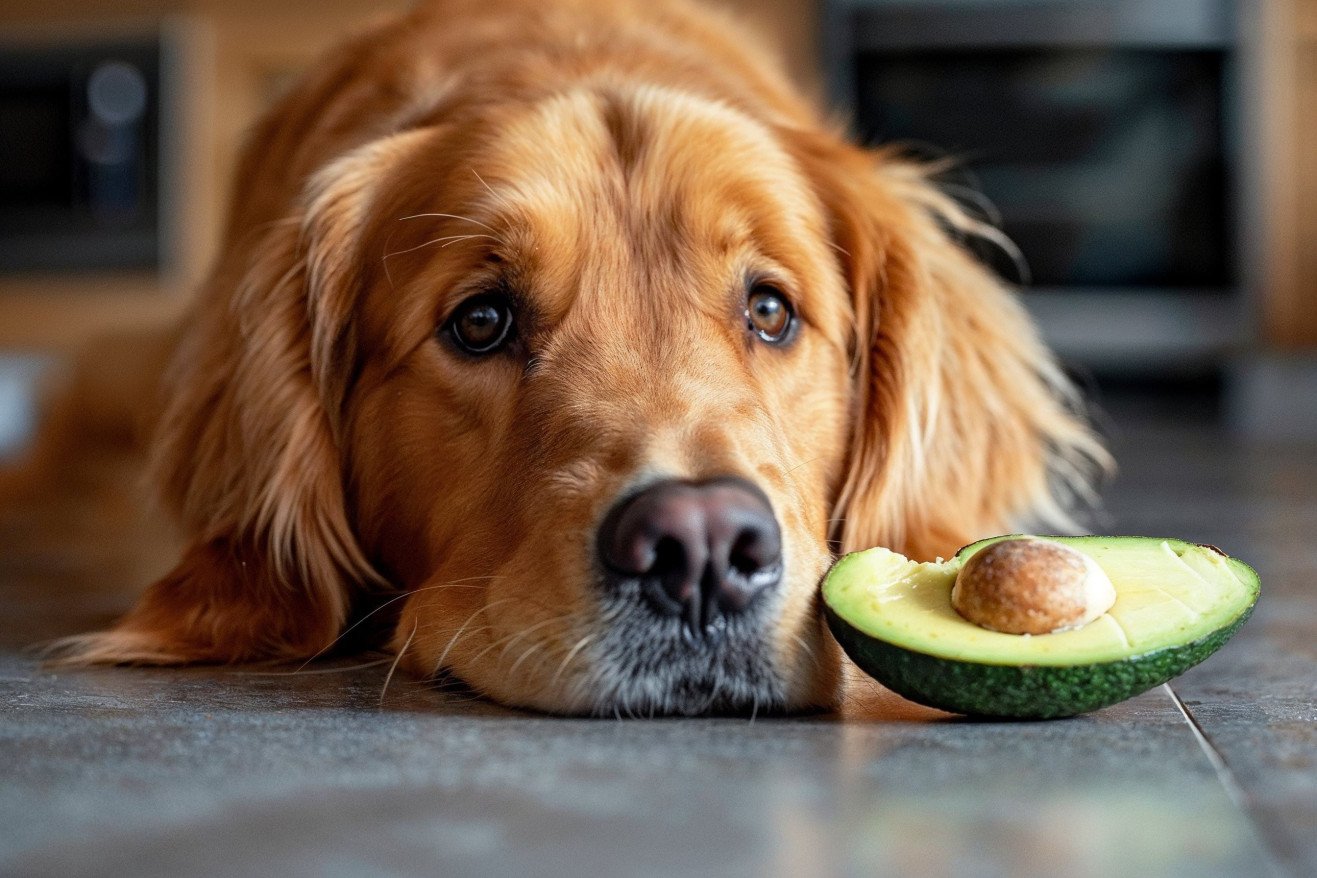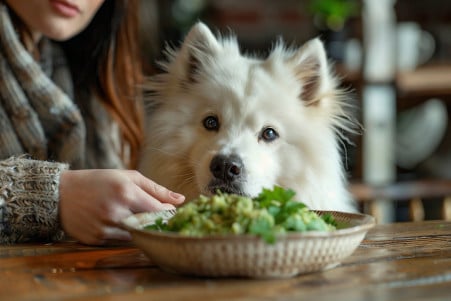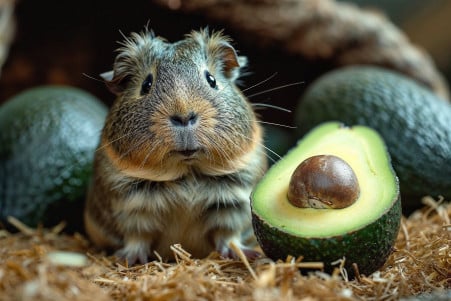Can Dogs Eat Avocado? Unpacking the Risks and Safe Practices
23 January 2024 • Updated 28 January 2024

Avocado has become a staple for health-conscious people, but is it safe to share this superfood with your dog? Dogs should not eat avocados because they contain persin, a fungicidal toxin that is harmful to some animals. While persin is less toxic to dogs, the flesh of the avocado is high in fat, which can lead to pancreatitis.
The avocado pit is a choking hazard. The flesh of the avocado may be safe in small amounts, but always check with your vet first.
In this article, we’ll take a deep dive into nutritional research, veterinary studies, and dog food recommendations to determine whether or not dogs can eat avocados.
We’ll also look at the details of dog nutrition and metabolism to help you understand how different foods affect your pet. Our goal is to help you make informed decisions about feeding your dog human food by providing you with the information you need to make the best choices for your pet.
Can dogs eat avocado?
Persin Poisoning: What It Is and How It Affects Dogs
Persin is a fungicidal compound that avocados produce to protect themselves from fungi and insects. While persin is a survival mechanism for the avocado plant, it can be toxic to many animals. According to the Merck Veterinary Manual, persin is found in all parts of the avocado plant, including the fruit, stems, and leaves, but the seed is the most toxic part of the plant, with the leaves being the next most toxic.
The sensitivity to persin varies greatly between species. While birds and large mammals, such as cows and goats, are highly sensitive to the toxic effects of persin, dogs have been found to be relatively insensitive. However, Pet Poison Helpline notes that dogs can develop complications, including foreign body obstruction and pancreatitis, from the high-fat content of avocados and from eating the avocado pit.
If your dog eats avocado, watch for signs of distress, such as vomiting, diarrhea, or lethargy, which could be a sign of potential health issues. Animal Poisons Helpline recommends that you get veterinary care as soon as possible because while dogs and cats are not known to show myocardial or mammary effects from persin, early treatment can save their lives.
It’s important to note that the risk to your dog is not just from persin; the high fat content of avocados should also be taken into account for their overall health.
How Much Fat Is in Avocado and Is It Safe for Dogs?
Fats are an important part of a dog’s diet, providing energy and helping to maintain healthy cells, but it’s also important to maintain a healthy balance. PetMD explains that while essential fatty acids are important for skin and coat health and to reduce inflammation, too much fat, especially from high-fat sources like avocado, can lead to problems like pancreatitis.
This is the inflammation of the pancreas, and it can be caused by a dog eating a diet that’s too high in fat, according to the American Kennel Club.
The risk of fat-related health issues in dogs depends on the dog’s size, age, and health status. For example, a small dog may be more likely to experience problems from a high-fat diet than a larger dog. The Association of American Feed Control Officials provides guidelines for fat in dog food, including minimum crude fat levels. However, these are just general recommendations, and the needs of individual dogs can vary widely.
In the case of avocados and dogs, it’s important to remember that avocados are high in fat, so they should be fed to dogs in moderation. While a small amount of avocado may not be harmful to a healthy adult dog, if fed regularly, it could lead to weight gain or other health problems.
It’s important to keep an eye on a dog’s overall fat intake and follow a vet’s recommendations to ensure a dog’s health.
How Dogs Process Fat
Dogs have a digestive system that can handle a wide range of foods, which is evidence of their omnivorous nature.
According to Washington State University, a dog’s digestive system, including the stomach and pancreas, is important in the digestion of fats.
Yet, the effects of high-fat diets on dogs are not completely understood. A study published in PMC by Mariana C. Rossoni Serão found that a high-fat diet led to changes in the gut microbiota of dogs.
Dogs that eat high-fat foods like avocado may experience digestive upset, which could lead to pancreatitis. A study published in PMC by Sylvain Denis found that the impact of introducing high-fat foods to dogs is dependent on the dog’s breed, and that the dog’s size and breed can have a significant impact on their ability to digest fat.
This makes it important to understand the dietary needs of specific breeds to avoid digestive upset and ensure the health of our dogs when feeding them human foods like avocado.
How to Create a Healthy Diet for Your Dog
Your dog’s diet should be well-balanced and provide the essential nutrients needed for energy, growth, and bodily functions. According to PetMD, a healthy dog diet should include proteins, fats, carbohydrates, vitamins, minerals, and water. The American College of Veterinary Nutrition advises that when feeding dogs human foods like avocado, which is high in fats, pet owners should use caution and consider the nutritional content and potential risks of the food.
When adding new foods to your dog’s diet, it’s important to do so slowly. VCA Animal Hospitals recommends that pet owners add new foods in small amounts and watch for signs of intolerance, including gastrointestinal issues and allergic reactions. This is especially important when feeding dogs high-fat foods, as pet owners should monitor their dog’s weight and overall health to ensure that they are not becoming overweight or developing pancreatitis.
Before adding avocados or other human foods to your dog’s diet, it’s important to talk to your vet. Your vet can help you determine the best way to feed your dog based on their individual dietary needs and health.
It’s also important to remember that every dog is different, and their reactions to new foods can vary. Pay attention to your dog’s reaction to new foods and make changes to their diet as needed to ensure that they are healthy and safe, which will help them live a long and happy life.
A Word from FuzzyBites
In conclusion, we hope that this article has helped to clarify some of the confusion surrounding dogs and avocados. While avocados do contain persin, a fungicidal toxin, dogs are less sensitive to its effects than other animals, but caution is still recommended. We have also highlighted the potential health concerns of the high-fat content in avocados, including pancreatitis, especially in dogs that are genetically predisposed to fat intolerance.
Throughout this article, we have also emphasized the importance of moderation and close observation when it comes to feeding your dog human foods. It’s also important to remember that a well-balanced diet is key, and that while avocados are high in fat, they can be included in a dog’s diet in moderation and with the guidance of a veterinarian.
Most importantly, it’s up to us to ensure the safety and well-being of our dogs. By making informed choices about what we feed them, we can show our love and concern for our furry friends. After all, when it comes to feeding our dogs, it’s not just about what they can eat, but what they should eat to ensure a long, healthy, and happy life.


